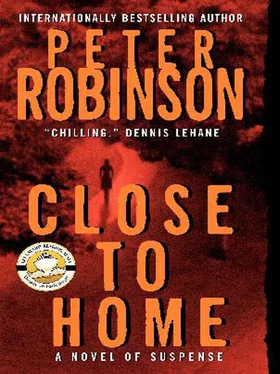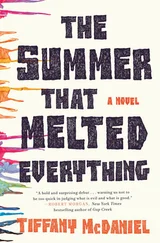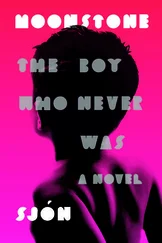“Yes, I’ve been expecting a visit,” said Barlow. “Terrible business. Let’s go inside. No, stay, Tristram. Stay!”
Tristram stayed and Banks followed Barlow into the bright, ordered interior of the house. He was clearly interested in antiques, and, by the looks of the gleaming sideboard and drinks cabinet, into restoring them, too. “Can I offer you a beer, or a lager perhaps? Or aren’t you supposed to drink on duty? One never knows, watching Morse and the like on telly.”
Banks smiled. “We’re not supposed to,” he said, not that it had ever stopped him. But it was far too early in the day, and he didn’t have weeding the garden as an excuse. “I’d love a coffee, if you’ve got some.”
“Only instant, I’m afraid.”
“That’s fine.”
“Come on through.”
They went into a small but well-arranged kitchen. Whoever had designed the maple cabinets over the slate-gray countertops had decided on following a pattern of horizontal grain rather than vertical, which made the room seem much more spacious. Banks sat at a breakfast nook with a red-and-white-checked tablecloth while Barlow made the coffee.
“Daddy, who’s this?”
A girl of about sixteen appeared in the doorway, all long blond hair and bare leg. She reminded Banks a bit of Kay Summerville.
“It’s a policeman come to talk about Luke Armitage, Rose. Off you go.”
Rose pouted, then made a theatrical about-turn and sashayed away, wiggling her hips. “Daughters,” said Barlow. “Have you any of your own?”
Banks told him about Tracy.
“Tracy Banks. Of course, now I remember her. I just didn’t put two and two together when I saw your identification. Tracy. Very bright girl. How is she doing?”
“Fine. She’s just finished her second year at Leeds. History.”
“Do give her my best regards when you see her. I can’t say I knew her well… so many pupils and so little time… but I do remember talking to her.”
Gavin Barlow looked a bit like Tony Blair, Banks thought. Definitely more of an Educational Unit manager than an old-style school headmaster, the way his predecessor Mr. Buxton had been. Banks remembered the old fellow who’d been in charge during the Gallows View case, when Banks had first moved up north. Buxton was the last of a dying breed, with his batlike cape and a well-thumbed copy of Cicero on his desk. Gavin Barlow probably thought “Latin” referred to a type of dance music, though maybe that was being a bit unfair. At least the radio station he was tuned in to was playing Thelonious Monk’s “Epistrophy” at eleven o’clock in the morning – a good sign.
“I’m not sure I can tell you very much about Luke,” said Gavin Barlow, bringing over two mugs of instant coffee and sitting opposite Banks. “It’s usually only the persistent troublemakers who come to my attention.”
“And Luke wasn’t a troublemaker?”
“Good heavens, no! You’d hardly know he was there if he didn’t move once in a while.”
“Any trouble at all?”
“Not really trouble. Nothing his form tutor couldn’t deal with.”
“Tell me.”
“Luke didn’t like games, and he once forged a note from his mother excusing him on the grounds of a stomach upset. It was a note the PE teacher remembered seeing a few months earlier, and Luke had traced it out with a new date. Quite a good forgery, really.”
“What happened?”
“Nothing much. Detention, a warning to his mother. Odd, as he wasn’t bad at all.”
“Wasn’t bad at what?”
“Rugby. Luke was a decent wing three-quarters. Fast and slippery. When he could be bothered playing.”
“But he didn’t like games?”
“He had no interest in sports. He’d far rather read, or just sit in a corner and stare out the window. God only knows what was going on in that head of his half the time.”
“Did Luke have any close friends at school, any other pupils he might have confided in?”
“I really can’t say. He always seemed to be a bit of a loner. We encourage group activities, of course, but you can’t always… I mean, you can’t force people to be sociable, can you?”
Banks opened his briefcase and slipped out the artist’s impression of the girl Josie Batty had seen going to HMV with Luke. “Do you recognize this girl?” he asked, not sure of how close a likeness it was.
Barlow squinted at it, then shook his head. “No,” he said. “I can’t say as I do. I’m not saying we don’t have pupils who affect that general look, but not very many, and nobody quite like this.”
“So you’ve never seen her or anyone like her with Luke?”
“No.”
Banks returned the sketch to his briefcase. “What about his schoolwork? Did he show any promise?”
“Enormous promise. His work in math left a lot to be desired, but when it came to English and music, he was remarkably gifted.”
“What about the other subjects?”
“Good enough for university, if that’s what you mean. Especially languages and social studies. You could tell that even at his early age. Unless…”
“What?”
“Well, unless he went off the rails. I’ve seen it happen before with bright and sensitive pupils. They fall in with the wrong crowd, neglect their work… You can guess the rest.”
Banks, who had gone off the rails a bit himself after Graham’s disappearance, could. “Were there any teachers Luke was particularly close to?” he asked. “Anyone who might be able to tell me a bit more about him?”
“Yes. You might try Ms. Anderson. Lauren Anderson. She teaches English and art history. Luke was way ahead of his classmates in his appreciation of literature, and in its composition, and I believe Ms. Anderson gave him extra tutoring.”
Lauren Anderson’s name had come up in the company’s records of Luke’s cell phone calls, Banks remembered. “Is that something the school does often?”
“If the student seems likely to benefit from it, then yes, certainly. You have to understand that we get such a broad range of abilities and interests, and we have to pitch our teaching level just a little above the middle. Too high and you lose most of the class, too low and the brighter students become bored and distracted. But it’s not all as bad as they say it is in the newspapers. We’re lucky in that we have a lot of passionate and committed teachers at Eastvale Comprehensive. Ms. Anderson is one of them. Luke was also taking violin lessons after school.”
“Yes, he had a violin in his bedroom.”
“I told you, he’s not your common-or-garden pupil.” Barlow paused for a moment, staring out the window. “ Wasn’t . We’ll miss him.”
“Even if you hardly knew he was there?”
“I was probably overstating the case,” Barlow said with a frown. “Luke had a certain presence. What I meant was that he just didn’t make a lot of noise or demand a lot of attention.”
“Who was giving him violin lessons?”
“Our music teacher, Alastair Ford. He’s quite a skilled player himself. Plays with a local string quartet. Strictly amateur, of course. You might have heard of them; they’re called the Aeolian Quartet. I understand they’re very good, though I must admit that my tastes edge more toward Miles than Mahler.”
The Aeolian. Banks had, indeed, heard of them. Not only that, but he had heard them. The last time was shortly after Christmas, at the community center with Annie Cabbot. They had played Schubert’s Death and the Maiden Quartet and made a very good job of it, Banks remembered.
“Is there anything else you can tell me?” he asked, standing to leave.
“I don’t think there is,” said Barlow. “All in all, Luke Armitage was a bit of a dark horse.”
Читать дальше












